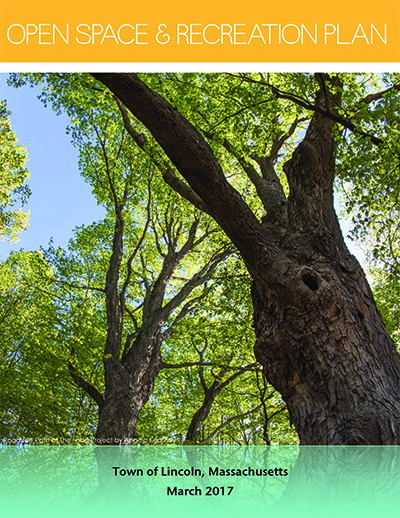 Lincoln’s recently completed 2017 Open Space and Recreation Plan (OSRP) identifies new and ongoing priorities for conservation measures, agriculture, recreation, and potential land acquisitions.
Lincoln’s recently completed 2017 Open Space and Recreation Plan (OSRP) identifies new and ongoing priorities for conservation measures, agriculture, recreation, and potential land acquisitions.
The OSRP Advisory Committee explored ways that key landholders can work together to prioritize shared uses for existing municipal, private, and institutional land. Land across town was prioritized based on a set of criteria for suitability for one or more of these uses. The result of this process is the open space and recreation action plan and accompanying map, which are intended to guide decisions about future land acquisitions and conservation partnerships.
Among the report’s goals for the Conservation Department and Lincoln Land Conservation Trust are to continue and in some cases expand the following efforts:
- Developing the Baseline Inventory and Monitoring Program for new and existing conservation properties. This includes acquiring legal records validating each property’s conservation status, gathering documentation such as photographs and biological inventories, and establishing a monitoring program for all deeded and CR (conservation restriction) properties.
- Controlling non-native, invasive species.
- Engaging in education and outreach efforts within municipal government, local and regional organizations, schools, and the general public.
- Identifying and protecting critical parcels or corridors that play a key role in fulfilling the goals of the OSRP.
- Promoting co-sustainable agricultural practices, such as community-supported agriculture and regional land/farmer matching programs, the Pollinator Meadow on the Lincoln School campus, mobile chicken farming at Codman Community Farms, and sustainable crops and livestock farming at Drumlin Farm.
- Considering licensing some fields that currently lie fallow in the interest in promoting local, sustainable farms and increasing the diversity of farming operations in Lincoln.
One of the top priorities identified during the 10-month planning process is to improve the town’s athletic fields, which are in poor shape due to heavy use and lack of irrigation. Voters at Town Meeting last week approved construction of a new field on the Wang property, but this will reduce usage of the existing fields only moderately. Capital improvements such as increasing access to wells and irrigation should be considered and the upcoming school project should also examine possibilities for adding another additional field, the report says.
Other future recreation facilities that would require more land are a skate park, neighborhood parks, basketball court, and municipal track, the report notes. The newly acquired Wang property doesn’t have the right size or configuration to include a track around the future athletic field.
Specific segments of the OSRP and related documents can be found here:
Leave a Reply